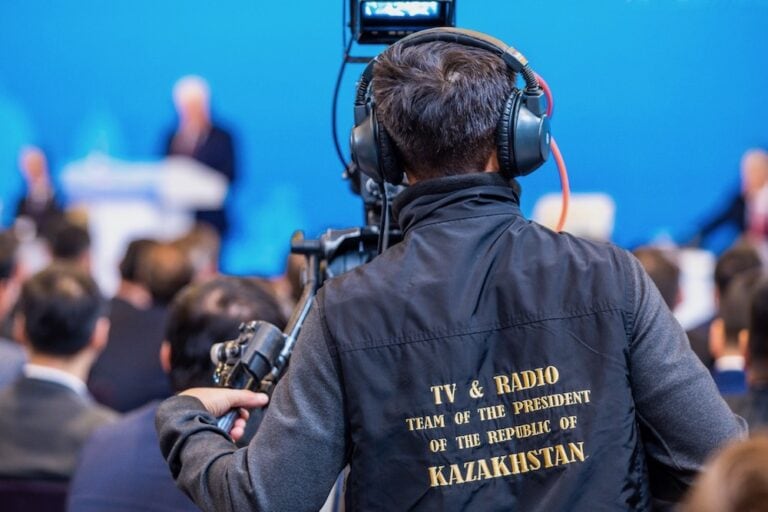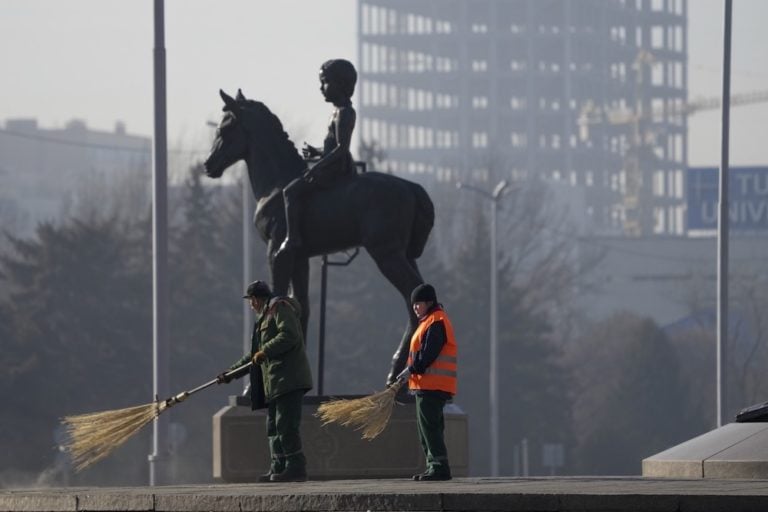(RSF/IFEX) – Media coverage of the 18 August 2007 legislative elections, swept by the ruling Nur Otan party, was “biased and heavily influenced by the authorities,” Reporters Without Borders said, adding that it would therefore oppose Kazakhstan’s bid to hold the rotating presidency of the Organisation of Security and Cooperation in Europe (OSCE) in 2009. […]
(RSF/IFEX) – Media coverage of the 18 August 2007 legislative elections, swept by the ruling Nur Otan party, was “biased and heavily influenced by the authorities,” Reporters Without Borders said, adding that it would therefore oppose Kazakhstan’s bid to hold the rotating presidency of the Organisation of Security and Cooperation in Europe (OSCE) in 2009.
“We regret the failure to meet international standards for democratic elections, which the OSCE has pointed out in a preliminary report as it did in previous elections,” the press freedom organisation said. “This critical shortfall was also seen in the Kazakh media’s elections coverage. There were many cases of pressure, self-censorship, violations of electoral legislation and bias in favour of the ruling party (now the only one in parliament) at the opposition’s expense.”
Reporters Without Borders added: “A country where press freedom stops whenever the authority of the president and his party is challenged is not fit to head an organisation such as the OSCE that defends democratic values. We therefore oppose Kazakhstan’s candidature to be OSCE president in 2009. Despite this year’s electoral reforms, the way the election was held has reinforced our fear that they were just window-dressing designed to win the support of the western countries.”
The independence of the media was widely restricted, despite a few positive developments such as the broadcasting of debates with all parties represented on the public TV stations Kazakhstan 1 and TV Kabar.
After the elections, the media were not able to report the criticisms voiced by the OSCE international observers. Only Channel 31 broadcast part of the OSCE news conference the day after the elections, in which the OSCE said it did not know “any democratic country with a single party in parliament.” The other TV stations concentrated on criticising the behaviour of the foreign media (especially the Russian media) on election day.
The reports on the ruling party on Kazakhstan 1 and TV Khabar were all positive and much more numerous that those on the other parties. On election day, Kazakhstan 1 ran a one-hour documentary glorifying President Nursultan Nazarbayev in violation of article 27.2 of the electoral law banning campaigning on the day of the election.
The leading opposition party, the All-National Social Democratic Party (ANDSP), received very little coverage on the public TV stations (3 to 4 per cent of overall election coverage air time). Privately-owned TV Astana’s coverage was similarly biased. Two other privately-owned stations, KTK and Channel 31, dropped their political analysis programmes during the election campaign. KTK often broadcast negative comments about the ANDSP.
Channel 31 was the only station to try to comply with a legal requirement to refer to all the political parties in its news reports on the election campaign. Channel 31 also broadcast pre-recorded debates involving all the parties. But some of the journalists at this station, which is owned by a Nazarbayev supporter, said on condition of anonymity that many election stories were rejected when proposed at editorial meetings, indicating that the control came from the top.
Opposition newspaper distributors reported large numbers of copies being bought up by unidentified persons. Even if this did not break any law, it shows there was a concerted effort to prevent the free circulation of print media.
Finally, as Reporters Without Borders reported in a release on 17 August, the public TV stations refused to broadcast two ANDSP elections spots entitled “It is time to return the country to the people” and “One country, two destinies.” They did so on the grounds that article 164 of the criminal code bans calls for social hatred, and their decision was confirmed by the high court. This was a clear violation of the spirit of this law.


